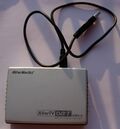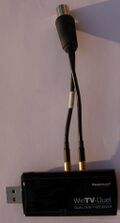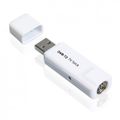DVB-T2 USB Devices: Difference between revisions
| Line 7: | Line 7: | ||
==Firmwares== |
==Firmwares== |
||
Many of the devices on this page need a firmware, the best source for firmwares is [https://github.com/OpenELEC/dvb-firmware OpenELEC dvb-firmware repository]. |
Many of the devices on this page need a firmware, the best source for firmwares is [https://github.com/OpenELEC/dvb-firmware OpenELEC dvb-firmware repository]. |
||
The firmwares on OpenELEC's repository are already extracted, just download the proper .fw file and copy to your firmware folder (usually /usr/lib/firmware). |
The firmwares on OpenELEC's repository are already extracted, just download the proper .fw file and copy to your firmware folder (usually /usr/lib/firmware). |
||
Revision as of 19:05, 13 February 2014
On this page you will find information regarding DVB-T2 USB devices.
- The information contained here is likely non-exhaustive and, despite best efforts to do otherwise, may contain errors. (Please help to keep these lists up-to-date so that they are useful for everyone!)
- If your device is not listed, try:
- searching the existing mailing list archives:
- searching for information with Google or other internet search engine
- by posting a question about the device directly to the LMML (but please do conduct a search first, as it may already have been discussed!)
- Note: when it comes to support, it is generally a good idea to try the current V4L-DVB sources because some device drivers can be very new and thus may have not made their way into the mainstream kernel.
- In any regard, in respect to the above listed suggestions, you may find it to be the case that your device is actually already supported or that experimental support is available.
- Because the component constitution on many devices are often similar or identical, there may be devices that are unlisted but may actually work with the existing driver framework for previously supported devices. In such a case, your non-listed but working device will likely be reported in your system messages as being one of those previously supported devices. If you encounter such an occurrence, please do report your success on the LMML so that proper detection/identification of your device can be added within the drivers.
- Lastly, it bears worth repeating the request: Please help to keep these lists up-to-date so that they are useful for everyone!
Firmwares
Many of the devices on this page need a firmware, the best source for firmwares is OpenELEC dvb-firmware repository.
The firmwares on OpenELEC's repository are already extracted, just download the proper .fw file and copy to your firmware folder (usually /usr/lib/firmware).
DVB-T2 USB Devices
The following tables list the known DVB-T2 USB devices and provides a brief summary of their features and components. (or at least it should)
If you need more technical information on a device, have a look at its device specific wiki article if there is one.
The device specific article is linked via the device's name but not all are linked yet. If you find an article (e.g. via the search feature on the left) then please edit the device entry here add that link. Just click on the edit icon in the last column of the device's row.
If you are unsure about how to do it, click on the edit icon for a device that already has a link to see how it is done. Please feel free to create a device specific page if there is enough worthwhile information that doesn't fit in the comments field.
There is also a full detail table.
If you'd like to add a new device (supported or unsupported), please go to Template:USB_Device_Data and follow the instruction there. If a device is unsupported, please add with which OS/kernel version you tested last.
If you are experiencing problems with USB devices, it may not be the fault of the tuner. For example AMD 700 series chipsets (e.g. 780G) have a problem with USB ports which results in tuners working or partially working or not working at all. This can be solved by using a separate USB adapter with a reliable chipset (e.g. VIA 6212L, NEC).
| Vendor Device/Model |
Supported | ID on Interface |
Hardware | Firmware | Comment / Pictures | URL | E |
|---|---|---|---|---|---|---|---|
| Anysee E7 | ✘ No | 1c73:861f USB2.0 | N/A | This is a generic entry for the Anysee E7 line. If you have details for a particular device, please feel free to clone this entry and add the details. 
|
[1] | ||
| AVerMedia AVerTV DVB-T USB 2.0 A800 | ✔ Yes, in kernel since 2.6.13 | 07ca:a800 USB1.1 USB2.0 | DiBcom 3000P dvb-usb-a800.ko | dvb-usb-avertv-a800-02.fw | Remote control handling is different to the one used in the other DiBusb clones and many essential keys do not work at all (with X.org and linux kernels 2.6.17 and 2.6.18). warm id: 07ca:a801 
|
[2] | |
| TerraTec Cinergy T Stick RC HD | ✔ Yes, in kernel since 2.6.37-rc6 | 0CCD:0097 USB2.0 | Afatech AF9015, Tuner TDA18218 | dvb-usb-af9015.fw | Also known as "Cinergy T RC MKII". On this version the outer package says "Cinergy T RC" and a label on the stick itself says "MKII". Support for new tuner TDA18218 [3] is working with 2.6.37-rc6. 
|
[4] | |
| TerraTec Cinergy T Stick RC HD (rev3) | ✔ Yes, in external project since 2012-05-07 | 0CCD:00D3 USB2.0 | RealTek RTL2832U, Tuner E4000 | none | working with linux-libre 3.2.1 and Ambrosa's RTL2832U driver patched with the USB id. RC not tested.  |
[] | |
| Microsoft Xbox One Digital TV Tuner | ✔ Yes | 045e:02d5 USB2.0 | DiBcom DiB7000 / Panasonic MN88472 / TDA 18250B | dvb-usb-dib0700-1.20.fw | |||
| Hauppauge Nova-TD Stick (52009) & WinTV-Duet HD | ✔ Yes, in kernel since 2.6.27 | 2040:5200 USB2.0 | dvb-usb-dib0700-1.20.fw | The stick has two tuners 
|
[5] | ||
| EMTEC S810 | ✔ Yes, in kernel since ? | 1164:2edc USB2.0 | dvb-usb-dib0700-1.20.fw | ||||
| GoTView MasterHD 3 | ✔ Yes | 5654:ca42 USB2.0 | RealTek RTL2832U | [6] | [7] | ||
| Geniatech T220 | ✔ Yes, in kernel since 3.14, Users reporting errors with DVB-T2 | 1f4d:d220 USB2.0 | Sony CXD2820R / NXP TDA18271HD/C2 / Cypress CY7C68013A | N/A | Looks like August DVB-T210 is a rebranded device with the same usbids. | [8] | |
| PCTV Systems nanoStick T2 290e | ✔ Yes, in kernel since 3.0 | 2013:024f USB2.0 | eMPIA em28xx, Sony CXD2820R, NXP TDA18271HD/C2 | N/A | First DVB-T2 capable receiver with Linux support. Kernel 3.2+ or latest media-build may be needed for multiple Empia-based devices to work together. Details on development history. |
[9] | |
| Astrometa DVB-T2 | DVB-T ✔ Yes, in kernel since 3.13, DVB-T2 ✔ Yes, in kernel since 4.6 | 15f4:0131 USB2.0 | RealTek RTL2832P, Panasonic MN88472 or MN88473, Rafael Micro R828D | Popular generic DVB-T2 USB tuner from different Chinese suppliers 
|
[10] | ||
| Geniatech T230 MyGica T230 August T210v2 Geniatech PT360 (USB-OTG) MyGica PT360 (USB-OTG) D202 (USB-OTG, OEM) |
✔ Yes | 0572:c688 USB2.0 | Silicon Labs Si2148-A20 or Si2158-A20, Silicon Labs Si2168-B40, Cypress EZ-USB FX2 CY7C68013A | dvb-demod-si2168-b40-01.fw, dvb-tuner-si2158-a20-01.fw | kernel >= 3.19, remote control supported. 
|
[11] | |
| Geniatech T230C MyGica T230C eyeTV T2 eyeTV T2 Hybrid eyeTV T2 Lite |
~ Partial You may have to build the drivers yourself | 0572:c689 USB 2.0 | Silicon Labs Si2141-A10, Silicon Labs Si2168-D60, Cypress EZ-USB FX2 CY7C68013A | dvb-demod-si2168-d60-01.fw dvb-tuner-si2141-a10-01.fw | Fully works if the correct drivers are used 
|
||
| Geniatech T230C2 MyGica T230C2 August DVB-T210 v2.0 August DVB-T230 |
✔ Yes, in kernel since 5.4 | 0572:c68a USB2.0 | Silicon Labs Si2141-A10, Silicon Labs Si2168-D60, Cypress EZ-USB FX2 CY7C68013A, Evolveo Sigma T2 | [dvb-demod-si2168-d60-01.fw, dvb-tuner-si2141-a10-01.fw] | Drivers can be built with media_build for older kernels. Evidence of August DVB-T210 v2.0 using Geniatech T230 in the past, ones bought today are likely to be T230C2 instead.   
|
[12] | |
| TerraTec Cinergy T2 Stick HD | ✔ Yes | eb1a:8179 USB2.0 | Silicon Labs Si2146, Silicon Labs si2168, Empia EM28178 | dvb-demod-si2168-a30-01.fw | kernel >= 3.19, remote control supported. 
|
[13] | |
| PCTV Systems tripleStick 292e | ✔ Yes | 2013:025f USB2.0 | Silicon Labs Si2157, Silicon Labs Si2168, eMPIA em28174 | dvb-demod-si2168-b40-01.fw | First version of the driver has been released, look here | [14] | |
| TechnoTrend TVStick CT2-4400 | ✔ Yes | 0b48:3014 USB2.0 | Silicon Labs Si2158, Silicon Labs Si2168, Cypress CY7C68013A | dvb-demod-si2168-a30-01.fw | [15] | ||
| TechnoTrend TT-connect CT2-4650 CI | ✔ Yes | 0b48:3012 USB2.0 | Silicon Labs Si2158, Silicon Labs Si2168, Cypress CY7C68013A | dvb-demod-si2168-a20-01.fw, dvb-tuner-si2158-a20-01.fw | [16] | ||
| TechnoTrend TT-connect CT2-4650 CI v1.1 | ✔ Yes | 0b48:3015 USB2.0 | Silicon Labs Si2157, Silicon Labs Si2168, Cypress CY7C68013A | dvb-demod-si2168-b40-01.fw, dvb-demod-si2168-02.fw, dvb-tuner-si2158-a20-01.fw | Patch for v1.1 (2016) | [17] | |
| Hauppauge Hauppauge_WinTV-soloHD | ✔ Yes | 2040:0264 USB2.0 | Silicon Labs Si2157, Silicon Labs Si2168, eMPIA em28174 | dvb-demod-si2168-b40-01.fw | First version of the driver has been released, look here | [18] | |
| Hauppauge Hauppauge_WinTV-dualHD Model 01590 | ✔ Yes, in kernel since 4.17 | 2040:0265 USB2.0 | Silicon Labs Si2157, Silicon Labs Si2168,Empia EM28274 | dvb-demod-si2168-b40-01.fw | Kernel >=4.7 first tuner only, kernel patch for both tuners. Kernel >=4.17 both tuners suported. | [19] |
Currently Unsupported DVB-T2 USB Devices
However, please note that inquiries to the mailing list:
- Should NOT be treated as an order drop-off queue. You're soliciting help from volunteer developers who work on V4L-DVB matters in their spare time, and such work can be non-trivial (i.e. requiring even thousands of hours work). So being demanding is one sure route to being ignored. (Honestly, this point really shouldn't even need to be written, but you'd be surprised at the number of irrational individuals who write into the mailing list demanding this or that).
- May pass without garnering a response—a distinct byproduct of the fact that there are a limited number of developers, whom might be able to help, that are associated with the project. Often times, even if they wished to help, their energies are entirely tied up with other projects. In such cases, the best path might be to try to spearhead the driver development for your device yourself, or hire someone who can.
Please don't add your device here, instead add it to the table above.
Supported by 3rd Party Drivers
Sometimes a manufacturer forks v4l-dvb all on their own and writes a driver for their device so they can claim Linux support.
In-Kernel 3rd party Drivers
Advantages:
- It's possible your device will work.. for the moment.
- If the manufacturer provides open source drivers with an acceptable license, volunteers could technically implement this code in the Linux kernel for true support. However.. :
Disadvantages:
- The quality of the code (if open, there are also cases where you just get a binary blob) too often just isn't good enough and there's still too much work to be done to make the device work. There was probably a reason the manufacturer didn't just send their patches to the linux-media mailinglist.
- Depending on what exactly the manufacturer did, you may have to reinstall the drivers every time your kernel is updated.
- When the manufacturer stops updating the drivers, the drivers will quickly refuse to install as newer kernels are released.
In case a manufacturer provides open source drivers the patches can be sent to the linux-media mailinglist Linux-Media Mailing List (LMML). Keep in mind however that if the license isn't compatible with the Linux kernel or the quality of the code isn't good enough, these will not become a part of the Linux kernel.
NOTE: As linux media drivers are character based, drivers can be also written using libfuse's character device in userspace example. If written that way, an out-of-kernel driver can be written, which fully integrates to udev without the disadvantage of closed source or incompatibility to other drivers. Such driver would rely on kernel fuse and character device in user space support as well as libfuse.
Closed source userspace drivers (Sundtek)
Advantages:
- Same driver works with different Linux versions
- No need to reinstall drivers when your kernel is updated.
- Drivers can be profiled easily and more accurately than in kernelspace.
- If the driver crashes, it won't crash the system or kernel, only the driver and applications using the driver will be affected. Userspace drivers can also be used when debugging drivers for USB host controllers, as the userspace driver can't crash the system, making debugging easier.
- If the manufacturer would stop to support the drivers, the userspace driver will still continue to work with newer Linux systems
Userspace drivers use a modern device infrastructure, Kernelspace drivers were available at a time when Linux did not support userspace drivers, Sundtek spent a substantial amount of work to make userspace drivers happen.
As a track record, most Linux distributions and many Settopboxes which were released since 2006 are supported, even open source drivers don't have such a high backward compatibility.
Disadvantages:
- You can't look into the sources. While this may be not a problem for end-users, in case of issues Sundtek provides a support forum.
Kernel Drivers
Userspace Drivers
- Sundtek MediaTV Pro III (DVB-C/T/T2/AnalogTV/FM Radio/Composite/S-Video)
- Sundtek MediaTV Digital Home III (DVB-C/T/T2)